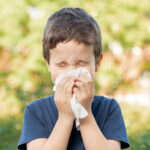SHOCKING: 13 percent of children have two or more allergic conditions, study reveals
 (NaturalHealth365) A new study published in Pediatrics, the journal of the American Academy of Pediatrics (AAP), reveals some interesting trends in childhood allergies and asthma, including when common childhood allergies are first diagnosed.
(NaturalHealth365) A new study published in Pediatrics, the journal of the American Academy of Pediatrics (AAP), reveals some interesting trends in childhood allergies and asthma, including when common childhood allergies are first diagnosed.
And while the study – which was funded by the National Institutes of Health (NIH), the Pennsylvania Allergy and Asthma Association, the Children’s Hospital of Philadelphia (CHOP), the AAP, and the U.S. Department of Health and Human Services (HHS) – conveniently (or perhaps suspiciously) overlooks the potential role of childhood immunizations in the development of allergic conditions, it does seem clear that more and more kids are suffering these days than ever before.
Around 13 percent of kids in the United States could be living with at least two or MORE allergy-related conditions, according to new study
To conduct the study, researchers from CHOP analyzed health record data from more than 200,000 pediatric patients under the age of 18 between the years 1999 through 2020. Their goal: to describe “clinical and epidemiologic patterns of pediatric allergy.”
Here are a few key findings from the massive study:
- Over 13 percent of children in the sample had two or more allergic conditions, with certain conditions more frequently occurring together (e.g., asthma and allergic rhinitis, aka hay fever)
- On average, childhood eczema tends to be first diagnosed at just 4 months old
- On average, childhood food allergies and asthma tend to be first diagnosed at 13 months old (with allergies to peanuts, eggs, and shellfish being among the most common); another rare food allergy called eosinophilic esophagitis (EoE) tends to be diagnosed at around age 35 months
- On average, childhood allergic rhinitis tends to be first diagnosed at 26 months old
Clearly, asthma and allergies are rising among our nation’s kids. But what could be the cause?
Hypotheses abound, including vitamin D deficiency, obesity, widespread antibiotics and acetaminophen use, and even the “hygiene hypothesis,” which says that kids living in increasingly sterilized and clean environments “aren’t being exposed to germs that train their immune systems to tell the difference between harmless and harmful irritants,” according to the American Academy of Allergy, Asthma & Immunology.
Discover a Simple and Effective Way to Remove Toxins: This is Jonathan's #1 choice for at-home detoxification. Special offer ends Feb. 16.
However, the potential role of aluminum and shots is less talked about. Talk about the elephant in the room!
Indeed, Children’s Health Defense (CHD) senior director of science and research, Dr. Brian Hooker, was recently quoted by CHD in an article discussing the CHOP study, in which he said that he finds it “incredible that the authors of the Pediatrics paper overlooked vaccines as a potential cause of allergies, given that even the CDC [Centers for Disease Control and Prevention] has made the connection between aluminum in vaccines and asthma as well as eczema.”
It makes you wonder: are concerned parents seriously being gaslit into believing that the 70+ doses of vaccines recommended by the CDC for kids before their 18th birthday aren’t impacting children’s immune function? Is the correlation between increasing chronic disease rates and the hefty childhood vax schedule, not one to be taken seriously and investigated properly? Whose best interest is really at heart here: our children or the pharmaceutical industry?
Should you talk to your child’s doctor about allergies? These are the signs and symptoms of childhood allergies to look out for
As a parent, your child’s health is your top priority. So you shouldn’t hesitate to talk to a doctor if you’re worried about unusual signs and symptoms in your kids.
According to the American College of Allergy, Asthma & Immunology (ACAAI), these are some of the most common allergy symptoms in kids to be aware of:
- Skin rashes or hives (atopic dermatitis or eczema)
- Difficulty breathing (asthma)
- Sneezing and coughing
- Runny nose
- Itchy eyes
- Ear infections
- Stomach upset
These symptoms are most often triggered by the following substances or allergens:
- Tree pollen, plant pollen, insect bites or stings
- Pet or animal hair or fur
- Dust mites
- Mold
- Cigarette smoke
- Perfume
- Car exhaust
- Foods, including peanuts, eggs, milk and milk products
If you notice any of the above signs or symptoms – or if you suspect any of the triggers mentioned above are irritating your child – connect with a trusted (holistic) healthcare provider near you. These providers can help you identify the root of your child’s symptoms and teach you how to support their immune function and overall well-being.
Of course, to reduce the risk of allergic reactions, try your best to eat an organic (chemical free) diet; avoid unwanted chemicals in household or personal care products; use an air purification system to keep indoor air clean and purify your drinking water. All of this will go a long way to improving the health of your family.
Sources for this article include:



